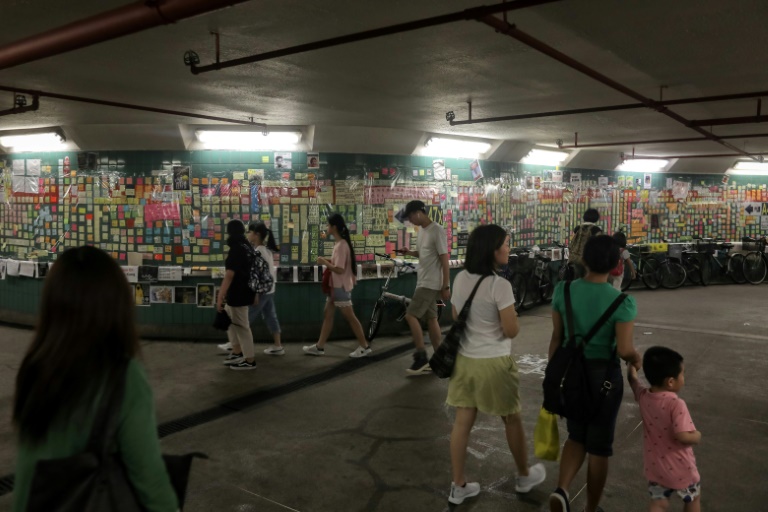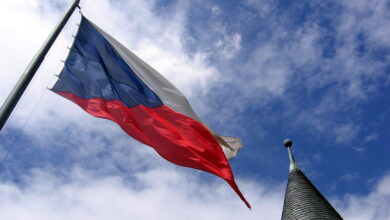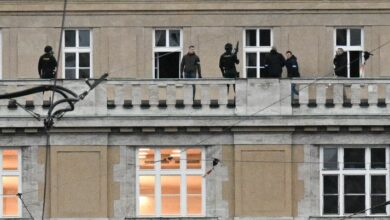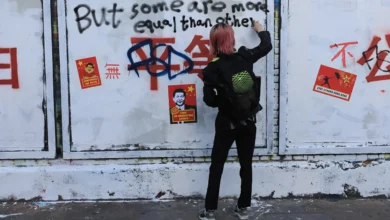
Plastered in colourful sticky-notes carrying messages of defiance against Hong Kong’s government, so-called “Lennon Walls” have sprung up across the city — though fights have broken out as Beijing loyalists try to tear them down.
The first wall was a uniquely Hong Kong take on a public graffiti display in Prague, which has been around ever since the 1980 murder of John Lennon.
Anyone can paint on the Prague wall, making it a constantly evolving canvas of counter-cultural messages inspired by the ex-Beatles star.
 AFP / VIVEK PRAKASH Protesters in Hong Kong leave boxes of pens and sticky-notes at each ‘Lennon Wall’ and cover them in plastic for protection
AFP / VIVEK PRAKASH Protesters in Hong Kong leave boxes of pens and sticky-notes at each ‘Lennon Wall’ and cover them in plastic for protectionHong Kong’s versions reflect recent years of political unrest as Beijing stamps down on the city’s freedoms, and first showed up in 2014.
That year student-led protests took over key intersections of Hong Kong for more than two months, calling for the right to directly elect the city’s leader.
A “Lennon Wall” sprang up on a staircase leading up to the city’s parliament, covered in thousands of sticky-notes.
 AFP / VIVEK PRAKASH Some of Hong Kong’s protest walls have also become flashpoints for violence
AFP / VIVEK PRAKASH Some of Hong Kong’s protest walls have also become flashpoints for violenceA banner which flew from a bridge next to the wall throughout the occupation quoted Lennon’s song Imagine: “You may say I’m a dreamer, but I’m not the only one”.
Those protests failed to achieve any concessions from Beijing and the wall was removed when the protest camps were cleared.
Five years later Hong Kong is gripped again by roiling anti-government protests — this time sparked by a widely loathed and now suspended plan to allow extraditions to the mainland.
And the protest walls are back.
‘Hang in there’
What makes these incarnations different is that they have blossomed at different locations across the city after another “Lennon Wall” outside the parliament was destroyed by a crowd of pro-government supporters two weeks ago.
 AFP / VIVEK PRAKASH A poster reading “my friend, don’t leave…Hong Kongers, don’t give up”, is one of many messages to appear on protest walls around Hong Kong
AFP / VIVEK PRAKASH A poster reading “my friend, don’t leave…Hong Kongers, don’t give up”, is one of many messages to appear on protest walls around Hong KongThe walls carry a variety of messages for Carrie Lam, the city’s unelected pro-Beijing leader, from the polite to the profane.
Protesters leave boxes of pens and sticky-notes at each wall and cover them in plastic to protect the displays from Hong Kong’s regular tropical downpours.
At a wall in Tsuen Wan, a district far from Hong Kong’s packed centre, a 19-year-old student surnamed Lau was using an ink stamp that someone had left featuring two Chinese characters which have gone viral in recent weeks.
 AFP / VIVEK PRAKASHSticky notes plastered on walls across Hong Kong carry a variety of messages for Carrie Lam, the city’s unelected pro-Beijing leader
AFP / VIVEK PRAKASHSticky notes plastered on walls across Hong Kong carry a variety of messages for Carrie Lam, the city’s unelected pro-Beijing leader“It’s a clever piece of calligraphy,” he told AFP. “If you read the characters one way it says ‘Hong Kong’ but if you turn it on its side it reads ‘Add Oil'”.
Add oil is a popular Cantonese phrase to express encouragement and has been chanted with relish by protesters over the last month.
Many messages carry similar themes like “Hang in there” and “Don’t lose heart”. Others take aim directly at Beijing. “Hong Kong is not China…yet” is a common refrain.
“Be Patient, Be Water” added another note, referencing a mantra of adaptability espoused by martial arts fighter and local legend Bruce Lee.
There are also messages scrawled by foreign visitors and inhabitants. “Stay strong Hong Kong, New York’s got your back,” read one. “You guys are the bravest,” added another in French. “Hong Kong freedom” added another by a man who signed off with his name “Waqas” and “Pakistan”.
“We are Filipino and we love Hong Kong,” said another, likely drawn by one of the hundreds of thousands of low-paid domestic helpers who are a vital part of the city’s economy.
Fights
But the walls have also become flashpoints.
On Wednesday night, fights broke out when groups of men who support Hong Kong’s government tried to tear the sticky-notes down.
 AFP / VIVEK PRAKASH ‘Lennon Walls’ in Hong Kong are tied to the city’s recent years of political unrest
AFP / VIVEK PRAKASH ‘Lennon Walls’ in Hong Kong are tied to the city’s recent years of political unrestThe “Lennon Wall” where that confrontation took place was close to a subsidised housing complex for many retired police officers and civil servants.
Another clash, captured on video, showed a pro-Beijing loyalist repeatedly punching another man in the face.
The young pro-democracy protester refused to fight back or defend himself, winning praise online for his non-violence. His attacker was arrested.
Many of the “Lennon Walls” are fully or partially destroyed in the small hours of the morning.
But they soon spring back up.
As one note in Tsuen Wan declared: “They may ruin the wall, yet they are unable to ruin the will.”




